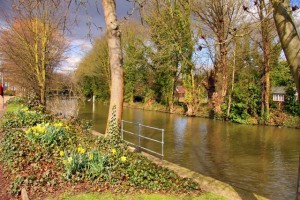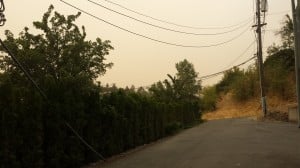It was 2001 and I’d been living in England for a year. My friend Matt moved to England with his entire library of beloved paperbacks and introduced me to many great books. He had an amazing collection of sci-fi and fantasy from authors I’d never heard of. Frankly, I never was much of a fiction reader before that. I’d enjoyed my fiction in the form of graphic novels or film, and consumed books almost exclusively for their non-fiction content. All of the books I read from Matt’s library in 2001 and 2002 were great escapes. Many of them gave me alternate ways to look at the world around me. One series introduced me to Tamesis, Goddess of the Thames.
What’s really strange about my Tamesis experience is that it didn’t come from a book about Celtic lore, Pagan religion, or even about a story on Earth. The catalyst was a book series called “The Seventh Sword” by Dave Duncan. In this series, the main character is ripped out of the ordinary, modern world and transplanted to another world — another universe? — where mythology is real, where gods of land and rivers and fire really do have power, and he’s chosen to be the swordsman for the Goddess of the river.
The world where Wallie finds himself is one where the Goddess has complete control over the flow of the river and the boats on it. If you fall into the river, you should be eaten by crocodiles, but if the Goddess so chooses, you will swim to the edge and walk out perfectly safe. When you get into a boat, everyone knows that one city follows the next under normal circumstances and that it takes a certain amount of time, on average, to get from one place to another. But when the Goddess wills it, you may find yourself leaving one port and arriving in the same port a few days later, or you may find yourself only hours after leaving one city arriving in a far off place that should be weeks away.
I lived a short walk away from the Thames in a town called Maidenhead in 2001. I took walks along the river several times a week. As I read these books, I started to look at the river differently. I knew full well that if I got on the river in a kayak or a long boat I would arrive where I expect to, when I expect to. The river wouldn’t suddenly make a quantum shift to drop me off in London or in Reading with a couple hours of paddling. I’m not so gullible as to be swallowed whole by the fictional world of a book. And yet, having the story fresh in my mind altered my awareness as I walked along the river’s edge. It helped me see the river and its metaphors in new ways, and as a result I was connected to the Goddess of that river.
Sitting by the edge of the river, I would contemplate the rush of water, the gallons and gallons of it moving past me. It seems like a miracle, even though I can picture how water makes its way through the ground towards the river all along the length of the river, how the water fell to the ground as rain, how it became rain after being evaporated up into the sky. Knowing something of the mechanics of a thing does not change the uniqueness of that thing. There is still something magical about it all. There’s something distinctly unique about this river as opposed to any other.
At times I would think about the way that time flows and a river flows, and how rivers have little eddies and whirlpools where rocks and other obstructions change the course of just a part of the water. Might time be like that? Could it be that we wouldn’t even know it because we are like tiny bugs on a leaf in the river of time, and can only tell where we are, not where the rest of the river is going?
Other times I would sit and wonder about the personality of the river Thames. It may be a thing that we can describe with physics and math, but then so are humans. Just because electric messages and endogenous chemicals in my brain are responsible for my thoughts does not mean that there is no “me” having those thoughts. Who is the “Thames” that flows past?
Perhaps it was just because I was reading a book about a river Goddess, or perhaps it was because of something internal to me, but the common image of a God named Thames didn’t match up with the personality I recognized in the river. So, I started to search for more information in an attempt to reconcile my experience with the folklore of the the place. It turned out that Thames was not the first deity of this river. The river had been connected with a goddess long before Thames was ever mentioned. The earlier Celtic deity connected with the Thames was a Goddess named Tamesis, but there is very little information about her. The only thing I could do was go back to the river and seek the answers there.
It was a feeling of immediate recognition. When I spoke to the river in my heart through my internal image of Tamesis, I had a sense that I was talking to the River I knew. For the next two years, my relationship with her would grow deeper and deeper.
And then, of course, I left England. All my stories end that way, right? I travel to someplace new and the old friends are left behind. But gods are not left behind in quite the same way as human friends are. They are so much easier to bring with you in your heart, to talk to even when you are far away from their homes, and to “hear” in your heart in ways that defy physics but probably still has everything to do with those aforementioned endogenous brain chemicals.
A couple of years after leaving the banks of the Thames, I met other rivers in Eastern Washington and Northern Idaho. I found that each river had their own Spirit or God or Goddess. They each had their own personality. Often the echo of Tamesis in my heart could help me meet these new gods. Sometimes the new rivers would present themselves as just “another version of” my friend, the Goddess I already knew.
And all of it started with a piece of fantasy.

















